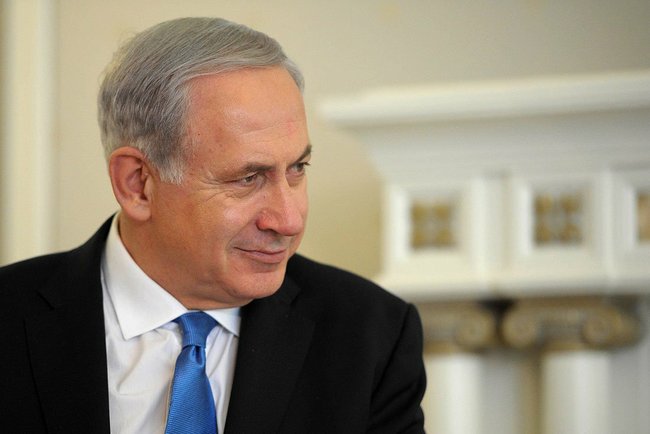
Israeli Prime Minister Benjamin Netanyahu's televised unveiling of an intelligence trove on Iran's alleged nuclear ambitions led to scepticism Tuesday from backers of a landmark 2015
accord, with European nations saying it showed the deal's importance.
The IAEA, the United Nations atomic watchdog, said it would evaluate any new relevant information, but cited its assessment from three years ago that it had no "credible indications" of an Iranian nuclear weapons pursuit after 2009.
Netanyahu's elaborate presentation live on television Monday night came ahead of a decision by US President Donald Trump, expected by May 12, on whether to withdraw from the nuclear agreement between world powers and Iran.
The Israeli premier said tens of thousands of documents recently recovered by intelligence operatives in Tehran proved his country's main enemy Iran had a secret nuclear weapons programme it could put into action at any time.
But the presentation that included props, video and slides immediately led to accusations from some that the White House and Netanyahu coordinated it as Trump considers whether to pull out of the nuclear deal he has harshly criticised.
Some analysts and proponents of the nuclear agreement also said Netanyahu had presented previously known details and failed to produce evidence that showed Iran was not abiding by the accord.
"The Israeli prime minister's presentation on Iran's past research into nuclear weapons technology underlines the importance of keeping the Iran nuclear deal's constraints on Tehran's nuclear ambitions," British Foreign Secretary Boris Johnson said.
Johnson said the agreement was not "based on trust about Iran's intentions; rather it is based on tough verification" by the IAEA.
European Union diplomatic chief Federica Mogherini said "I have not seen from Prime Minister Netanyahu arguments for the moment on non-compliance, meaning violation by Iran of its nuclear commitments under the deal."
"And again, the deal was put in place exactly because there was no trust between the parties, otherwise we would not have required a nuclear deal to be put in place."
France also said Netanyahu's claims reinforced the importance of the nuclear deal.
Netanyahu, speaking Tuesday in an interview with CNN, defended his presentation but also refused to respond to questions over Israel's nuclear capabilities.
Israel is widely believed to be the only nuclear-armed nation in the Middle East, but it has never acknowledged the capability.
- 'Infamous liar' -
Iran lashed out at Netanyahu, with foreign ministry spokesman Bahram Ghasemi on Tuesday calling him an "infamous liar".
Iranian Foreign Minister Mohammad Javad Zarif said immediately after the presentation that Netanyahu was "the boy who cries wolf".
Trump however welcomed Netanyahu's presentation, as did his Secretary of State Mike Pompeo, who met with the Israeli leader on Sunday in Tel Aviv.
The White House caused some confusion with its statement on the Israeli trove, at first saying it showed Iran "has" a secret nuclear weapons programme before later changing it to "had".
"These facts are consistent with what the United States has long known: Iran had a robust, clandestine nuclear weapons program that it has tried and failed to hide from the world and from its own people," the statement said.
Trump and his Middle East allies, particularly Israel, argue that the agreement approved by Barack Obama was too weak and needs to be replaced with a more permanent arrangement and supplemented by controls on Iran's missile programme.
The Israeli premier has repeatedly called for the accord -- which Iran signed with Britain, China, France, Germany, Russia and the United States -- to either be altered or scrapped.
In Monday night's presentation, Netanyahu accused Iran of lying about its nuclear ambitions, saying Israel had recently obtained tens of thousands of files in a "great intelligence achievement."
Iran has always denied it sought a nuclear weapon, insisting its atomic programme was for civilian purposes.
Netanyahu said the files had been moved to a secret compound in Tehran in 2017 that looked dilapidated from the outside.
- Half a tonne -
The material obtained weighed half a tonne, he said, speaking in English in the staged presentation in front of a bookcase laden with binders he said held copies of original documents and cases of CDs.
He detailed an alleged programme -- "Project Amad" -- that he said Iran was forced to shelve in 2003, but kept ready to put into action at any time while improving its "know-how".
He alleged the 2015 nuclear deal was "based on Iranian lies and Iranian deception", and said the trove had been shared with the US and would be shared with the IAEA and the rest of accord's signatories.
British officials confirmed to AFP that the invitation to inspect the files had been accepted, but gave no further details.
Pompeo, until last week director of the CIA, called the intelligence trove authentic and said much of it was new to US experts.
But others argued it failed to show the nuclear accord was a "terrible deal," as Netanyahu called it.
"The information in the documents Netanyahu revealed is not new," Dan Shapiro, US ambassador to Israel under Obama, said on Twitter, echoing the reactions of many other proponents of the deal.
But he added that Netanyahu's presentation will be "useful to Trump when he announces he is leaving the deal by May 12. I believe he has already made that decision. This presentation, coordinated with his team, will be cited as evidence to justify it."afp








































